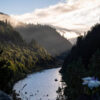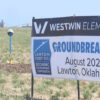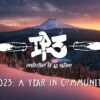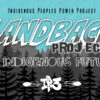|
Getting your Trinity Audio player ready...
|
In a recent installment of our regular online interview series, Skoden Talks with The Homies, we had the pleasure of catching up with Jolie Verela and are honored to hear her story as founder of Indigenous Women Hike. Verela, a hiker, Water Protector, and Land Defender comes from The Place of Flowing Water, Payahuunadü, also known as Owens Valley, California, and started Indigenous Women Hike in 2018 as an act of cultural reclamation and for her own journey towards self-care and healing. That year, she and a group of Indigenous women set out to hike the more than 200 mile Nüümü Poyo (John Muir Trail), without permits under the American Indigenous Religious Freedom Act, stating “we shouldn’t need a permit to travel and connect to our own homelands.” Aside from her work with Indigenous Women Hike, she stays involved in her community helping elders and community, supporting and planning their own movements.
Jolie, who didn’t start hiking until her late 20’s, describes the history of her homelands, a beautiful place where tens of thousands of people come to recreate, to climb, to hike, fish, and where famous trails run through their lands. Before founding Indigenous Women Hike, she shares that in the early stage of her journey, she was dealing with depression, having a rough time in her life, stating “the only thing that really made me feel good was getting up at 7 in the morning, strapping on my hiking boots, and going on a ten mile hike, going by myself and just experiencing the land and enjoying it,” before returning to her serving job. She noticed how solo hiking made her feel connected to her land, and acknowledges how her experience on the trail changed her life. While hiking those trails, she decided she would solo hike the 200 mile Nüümü Poyo trail on her own, making videos, and sharing her feelings of how good it felt to reach those milestones along the way. As other women in her community took notice of her journey, they found inspiration in her work, and this is how Indigenous Women Hike was born.
In those early days of Indigenous Women Hike, she explains that she has built positive relationships with employees of the Forest Service and National Parks, and how she prepared a presentation for Sequoia National Park. In those first trainings she experienced marginalization and “erasure language” of Indigenous Peoples, speaking in the past tense with no acknowledgment of the rich Indigenous history of the land. Upon recognizing the need for Forest Service and National Parks employees to understand this history, and for Indigenous folks to be included, she revised her presentation with a purpose, sharing “alright, I gotta talk about a lot of shit that went down today.” In that next presentation she stood up, spoke her heart out, and it resonated with those employees. At the end of that meeting, those who attended gave a standing ovation, now recognizing the need to honor the Earth beneath them.
As Jolie’s movement evolved, she recognized a need to collect camping and hiking gear for others to participate, and to build gear libraries for her group and other communities looking to start their own hiking groups. Through her journey she hopes that other Indigenous folks will get out on the land, to experience it, and organize their own movements. As we know, those who are doing this work know it can be heavy at times. She reminds us that when we are feeling the burn, to take time to rest and do the things we need to do for our own healing. If you’d like to learn more about Jolie and Indigenous Women Hike, we encourage you to find her on social media, like, share, subscribe, and spread the good word! Thank you, Jolie for sharing your time and your story with us! We are inspired by your work, and for the great things you do for our communities!
The IP3 Action Team
NOTE: You can watch the full interview here or on the Indigenous Peoples Power Project YouTube Channel. If you know of a person doing great work in our communities, and would like to nominate them for an interview on Skoden Talks With The Homies, feel free to contact us anytime at info@ip3action.org!









